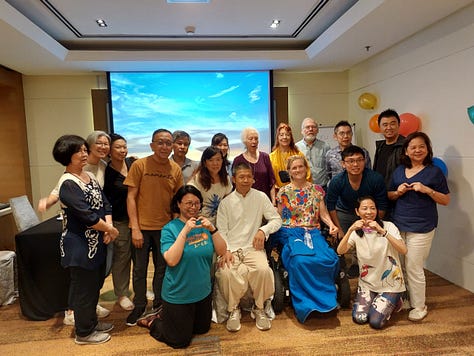


Disappeared for a week to pack my brain with new tricks! The highlight? Hosting the legendary Teacher Wei Qi-Feng, who trekked all the way from China with 30 years of QiGong wisdom, right here in humble Malaysia. We had an awesome squad of four super-enthusiastic Aussies, each sharing their QiGong adventures, making our learning epic. I'm a newbie with just 6 years under my belt (practically still in diapers!). My journey began when a friend wanted to start a QiGong center, and I jumped in to support him. The universe sure knows how to line up the stars! Today, I've grasped the essence of our profound Chinese 5 Arts and their connection with Yin/Yang (duality) and the Trinity of Heaven-Man-Earth.
Going to just keep this sharing sweet as the 7 days class is very pack with information and to the uninitiated, rather hard to just digest it. breaking this down into 4 level of practice (realm) which we have gone through and practice. I found the theory (framework) to be very practical and down to earth to apply.
Ming-Jue 明覺 Consciousness Field / Mindfulness
There's no perfect English word for this, so I've settled for the closest match. "Ming" translates to "Obvious" and "Jue" to "Feeling"—but calling it "obvious feeling" sounds pretty odd. The gist is to become an observer of your life and surroundings, eventually merging back into yourself with full awareness of what's happening. Imagine ejecting yourself from your body (yep, an out-of-body experience) to avoid being influenced by your current mindset. This practice is all about using the mind to direct the Qi, which in turn guides the necessary actions. If your brain feels like it's in a blender right now, that's exactly the reaction I expected at this stage!
This is the very essence of practicing any of the Five Arts: Mountain (山), Medicine (醫), Divination (卜), Destiny (命), and Physiognomy (相). They may seem worlds apart, but they all share a common thread—Qi as their fuel. Once you grasp Qi on one level, it becomes much easier to apply that knowledge across the disciplines, making sense of the practices and their specific methods. I'm thrilled to have been exposed to these knowledge bases at this stage of my study.
Reference Framework 参考系
We also dived deep into the concept of the reference framework—essentially, the mental programming we've been subjected to throughout our lives. This programming comes from our parents, society, and personal experiences, shaping how we react to the external world. Think of the classic "study hard, get a job, get married, buy a house, buy a car, have kids, and you'll be happy" routine. We explored why conflicts arise when our frameworks clash, as no two frameworks ever completely align.
The practice of Ming-Jue aims to elevate us above these frameworks, allowing us to see ourselves as architects who can reprogram our own code. This perspective helps us avoid becoming victims of our circumstances, giving us the power to reshape our responses and interactions. I know you gonna say “So easy mehhh !”
Emotion / Thought
This level is all too familiar to us earthlings. We often believe it's the controlling aspect of our lives, but in reality, it's the reactive part where we judge everything through our frameworks. When our mother says something that angers us, we instantly conclude she's interfering. This knee-jerk reaction happens because our brains have built neural pathways to make quick decisions for survival. Picture yourself encountering a tiger (back when they were a real threat); you had to decide instantly whether to run or fight—there was no time for negotiation (just like there's no negotiating with your spouse today).
To change this judgment-based reactive mechanism, we must first restructure our framework. And that can only happen if we allow ourselves to operate at the Ming-Jue level.
The Body / Action
The final part is where we start to see the actual movements we perform. These actions are the natural expressions of our reference framework. Imagine we are all actors on a stage, playing out our emotions based on a script (our framework) written by the director (Ming-Jue). Now, we're trying to step out of our roles as actors to observe our own performances, aiming to improve our actions by understanding the role of the act, script, and director.
By adopting this outside-in perspective, we're working to change our inside-out expressions. It's a beautiful way to redesign our lives and pathways, transforming how we engage with the world and ourselves.
As a decade-long practitioner of BaZi, FengShui, and QiMen, I've only recently gained a deep understanding of how these three arts work together. Charts, theories, and landforms are all tools to facilitate transformation by reprogramming the frameworks we've been trapped in and reacting to.
One profound concept shared is encapsulated in the saying "但知行好事,莫要问前程," which roughly translates to "When your intention is good, don't worry about the result."
As I organize the content for my Tai'Shan excursion happening from September 1-7, 2024, I'll be sharing my learnings. We'll explore how the Five Arts connect and how they can help you achieve your wishes and goals. If you're interested in joining the trip, just send me a message!




The deep dive into QiGong's essence and connection to the Five Arts was enlightening. Your explanation of "Ming-Jue" and the framework concept was spot-on and relatable. The personal touch of your journey and experiences added a wonderful dimension. I can't wait to hear more about your Tai'Shan excursion!
Hi Levin, very well written. Profound yet simple to understand. The real challenge is to practice Mindfulness, definitely doable 💪